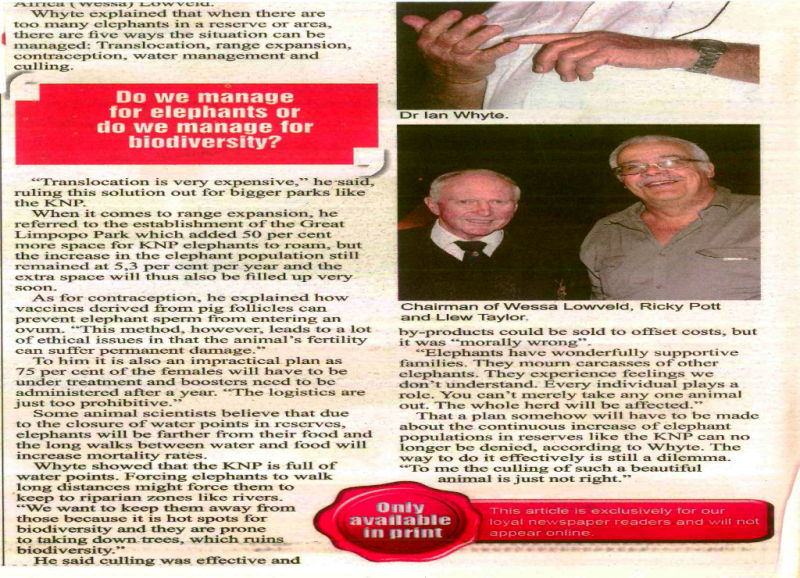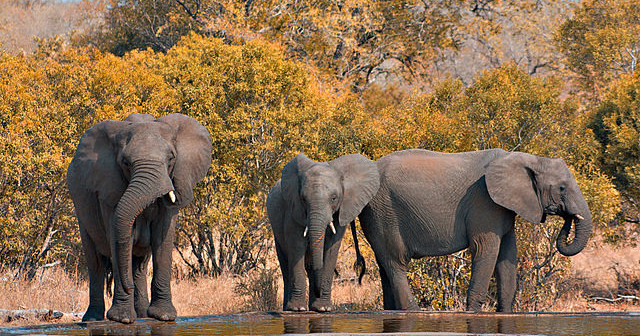Elephant Hunting/Culling/Contraception
- Lisbeth
- Site Admin
- Posts: 67392
- Joined: Sat May 19, 2012 12:31 pm
- Country: Switzerland
- Location: Lugano
- Contact:
Re: Elephant Hunting/Culling/Contraception
"Education is the most powerful weapon which you can use to change the world." Nelson Mandela
The desire for equality must never exceed the demands of knowledge
The desire for equality must never exceed the demands of knowledge
- Richprins
- Committee Member
- Posts: 75967
- Joined: Sat May 19, 2012 3:52 pm
- Location: NELSPRUIT
- Contact:
Re: Elephant Hunting/Culling/Contraception
Found out Department of Environmental Affairs has simply told SANParks there will be no culling of elephant in Kruger, end of story. 
Please check Needs Attention pre-booking: https://africawild-forum.com/viewtopic.php?f=322&t=596
- Lisbeth
- Site Admin
- Posts: 67392
- Joined: Sat May 19, 2012 12:31 pm
- Country: Switzerland
- Location: Lugano
- Contact:
Re: Elephant Hunting/Culling/Contraception
The poachers will correct that 



"Education is the most powerful weapon which you can use to change the world." Nelson Mandela
The desire for equality must never exceed the demands of knowledge
The desire for equality must never exceed the demands of knowledge
Re: Elephant Hunting/Culling/Contraception
Elephant contraception is not an answer in reserves that has a carrying capacity of more than a few elephant. The reason why is as follows.
Elephants has a social structure consisting of a Female group, the breeding herd. Young males leave the group to roam alone or in the company of Bulls. When a female of the herd comes into oestrus surrounding males will converge, fight for mating rights, thus throwing the herd into a cycle of serious stress. If we take a herd of 10 breeding cows, this will happen not more 10 times in 3 years, taking into consideration a period of 22 months for pregnancy, and on average 14 months for weaning of calf before a female comes into oestrus again.
In the effect of contraception it will happen 10 times every 4 weeks, thus increasing stress levels of the herds to above the accepted limits and standards for a establishment where tourists will reside and come into contact with these animals.
As example, a small reserve like Mabula, this can work as there is only 1 breeding bull regular in contact with the herd, thus not too much stressfull interference. But in Kruger, or any of the other parks with normal interaction it will create a dangerous environment. This was tried in Kruger in 20 years ago with dire consequence in the crocodile bridge area in Kruger. Aggressive elephant behaviour more than normal. Tourists getting vehicles charged and trashed, etc.
Elephants has a social structure consisting of a Female group, the breeding herd. Young males leave the group to roam alone or in the company of Bulls. When a female of the herd comes into oestrus surrounding males will converge, fight for mating rights, thus throwing the herd into a cycle of serious stress. If we take a herd of 10 breeding cows, this will happen not more 10 times in 3 years, taking into consideration a period of 22 months for pregnancy, and on average 14 months for weaning of calf before a female comes into oestrus again.
In the effect of contraception it will happen 10 times every 4 weeks, thus increasing stress levels of the herds to above the accepted limits and standards for a establishment where tourists will reside and come into contact with these animals.
As example, a small reserve like Mabula, this can work as there is only 1 breeding bull regular in contact with the herd, thus not too much stressfull interference. But in Kruger, or any of the other parks with normal interaction it will create a dangerous environment. This was tried in Kruger in 20 years ago with dire consequence in the crocodile bridge area in Kruger. Aggressive elephant behaviour more than normal. Tourists getting vehicles charged and trashed, etc.
nothing changed, i have not grown up yet.
- Richprins
- Committee Member
- Posts: 75967
- Joined: Sat May 19, 2012 3:52 pm
- Location: NELSPRUIT
- Contact:
Re: Elephant Hunting/Culling/Contraception
Interesting, Scips.
Ja, I still think it may work if they can figure out a way to contracept cows via darts from helicopters.
It is simply too expensive and stressful to drug them first and what not?
Best would be to be able to sterilise bulls from the air?
Their family problems are a small price to pay vs culling, IMO?
Ja, I still think it may work if they can figure out a way to contracept cows via darts from helicopters.
It is simply too expensive and stressful to drug them first and what not?
Best would be to be able to sterilise bulls from the air?
Their family problems are a small price to pay vs culling, IMO?
Please check Needs Attention pre-booking: https://africawild-forum.com/viewtopic.php?f=322&t=596
- Richprins
- Committee Member
- Posts: 75967
- Joined: Sat May 19, 2012 3:52 pm
- Location: NELSPRUIT
- Contact:
Re: Elephant Hunting/Culling/Contraception


Please check Needs Attention pre-booking: https://africawild-forum.com/viewtopic.php?f=322&t=596
- Lisbeth
- Site Admin
- Posts: 67392
- Joined: Sat May 19, 2012 12:31 pm
- Country: Switzerland
- Location: Lugano
- Contact:
Re: Elephant Hunting/Culling/Contraception
Does not help towards a solution 
Unfortunately I am afraid that poaching will resolve the problem sooner or later

Unfortunately I am afraid that poaching will resolve the problem sooner or later
"Education is the most powerful weapon which you can use to change the world." Nelson Mandela
The desire for equality must never exceed the demands of knowledge
The desire for equality must never exceed the demands of knowledge
- Richprins
- Committee Member
- Posts: 75967
- Joined: Sat May 19, 2012 3:52 pm
- Location: NELSPRUIT
- Contact:
Re: Elephant Hunting/Culling/Contraception
At least 8000 need to be removed, Lis, depending on the results of a proper census... 
Poachers won't be able to do that.
Dr Whyte is very respected and experienced, but ja, no solution...in the meantime we wait.
He is dead right about the threat to river vegetation, which is already happening seriously.
Poachers won't be able to do that.
Dr Whyte is very respected and experienced, but ja, no solution...in the meantime we wait.
He is dead right about the threat to river vegetation, which is already happening seriously.
Please check Needs Attention pre-booking: https://africawild-forum.com/viewtopic.php?f=322&t=596
- Lisbeth
- Site Admin
- Posts: 67392
- Joined: Sat May 19, 2012 12:31 pm
- Country: Switzerland
- Location: Lugano
- Contact:
Re: Elephant Hunting/Culling/Contraception

Hot debate on elephant culling vs contraception vs exports continues
BY GABI ZIETSMAN - 3 FEBRUARY 2018 -
Elephant population control has been a sensitive topic for many conservationists and wildlife agencies. Too many are viewed as destructive, and the most popular methods of control used by some Southern African countries have been culling, translocation – if there’s somewhere to put them – or exporting them overseas.
Audrey Delsink is a behavioural ecologist and executive director of Humane Society International (HSI) Africa and has worked with elephants for 20 years in South Africa. The organisation pushes for humane population control, and the HSI has been conducting studies with immunocontraception in elephant females. Completely reversible, the non-hormonal contraception limits population growth by mimicking their natural cycle rather than creating zero growth, and it can be tailor-made to meet the objectives of each park.
This year HSI will be working with the North West Parks and Tourism Board to test run this initiative, but have already almost 800 female elephants on treatment across 26 reserves in South Africa. These include parks like Pilanesberg National Park and Madikwe Game Reserve, where they have specifically been struggling with too large a population due to the lack of migration corridors. Malawi has also shown interest in the contraception method.
A designated elephant will get two vaccination shots in the first year, and then one shot annually after that. Once it has been determined the elephant can start breeding again, the shot can be skipped and the animal’s fertility will bounce back, depending on how long they have been on treatment. It costs between R1 500 and R2 000 per shot (includes medication, tranquilisers, helicopter and personnel), but this becomes cheaper if shots are done in bulk.
Delsink has however criticised the idea of elephant carrying capacity numbers for parks, claiming that biodiversity is always in flux.
“Who is to say that the confirmed amount of animals is what’s appropriate now,” says Delsink, but affirms that it remains a contentious issue.
However, due to elephants’ long lifespans, it will take a a few years before results from the contraception method can be seen, though no abnormal behaviour has been observed.
The contraception method also has little impact on the social structures of elephants, which can be heavily disrupted by culling and translocation, and their home ranges remain intact.
Critique of CITES’ handle of the international live elephant trade
Southern African countries, like Zimbabwe and Namibia, uses the problems of overpopulation to justify their export of live elephants, especially wild-caught ones. Other African countries however are banned from exporting as their populations are critically endangered.
From 1990 to 2015 a total of 1666 elephants have been exported across the world according to CITES data, the majority of which were exported for circus or travelling purposes. The other two top reasons for export was reintroduction and zoos, totaling 331. Only four was exported for ‘trophy hunting’, though that seems an unlikely number.
About 166 elephants were legally exported with ‘no listed purpose code’, and no one knows what happened to them. Other purposes cited also include commercial use, breeding, education and scientific, though the last two could easily be used as a purpose by places like zoos and interaction centres.
In 2018 these numbers will be higher, with Zimbabwe’s recent export of 30 calves to China and Namibia’s export of calves to a Dubai zoo.
Besides the problematic purpose categories, another issue that Delsink highlights is that the export and import numbers do not correlate, criticising CITES’ lack of effective control over the live elephant trade. Many elephants pass through the systems legally but disappear on the other side, although CITES puts the responsibility on the exporting scientific and management authorities “who must have advised that export will ‘not be detrimental to the survival of the species'” and “must be satisfied that the animals were legally obtained”.
“There is no captive facility suitably equipped to house and care for live, wild-caught African elephant calves forcefully removed from their family groups,” concludes Delsink and that it is of no benefit for the conservation of African elephants.
Currently South Africa and Botswana has a ban on live elephant export, though Delsink says this doesn’t mean “we should rest on our laurels” as there are always business interests that would push for the ban to be lifted.
Read original article: https://m.traveller24.com/Explore/Green ... l-20180203
"Education is the most powerful weapon which you can use to change the world." Nelson Mandela
The desire for equality must never exceed the demands of knowledge
The desire for equality must never exceed the demands of knowledge
- Richprins
- Committee Member
- Posts: 75967
- Joined: Sat May 19, 2012 3:52 pm
- Location: NELSPRUIT
- Contact:
Re: Elephant Hunting/Culling/Contraception
An old CUSTOS article about the culling depot at Sand River:
Please check Needs Attention pre-booking: https://africawild-forum.com/viewtopic.php?f=322&t=596


